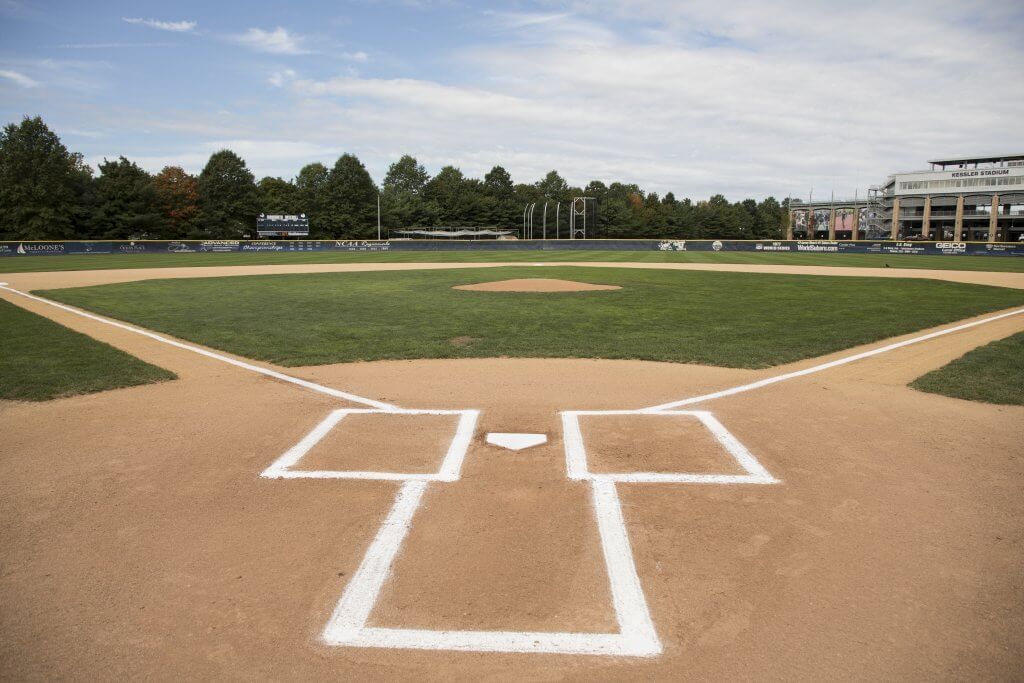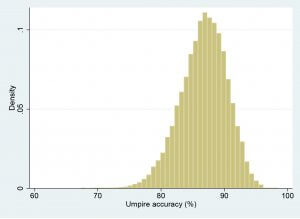
It’s hard enough to reach base when pitchers like Aroldis Chapman and Jacob deGrom throw the high heat. But what about when Mother Nature does?
A study by Monmouth University Associate Professor of Economics Eric Fesselmeyer finds that Major League Baseball (MLB) umpires call pitches less accurately in uncomfortable temperatures, with performance at its worst in extreme heat conditions. The analysis shows that the pitch-calling error rate is about 1 percentage point worse when temperatures are above 95 degrees, while accuracy is highest in games played in 80 to 90 degree weather. The results raise the prospect that America’s pastime could be impacted by climate change, as warming temperatures and more frequent heat waves threaten to cause a further decline in officiating.
“The drop in accuracy may seem small, but it is nontrivial for this high-revenue, high-stakes industry,” said Fesselmeyer, an affiliated faculty member of Monmouth’s Urban Coast Institute. “Moreover, high temperatures cause an even greater decrease in accuracy on close call pitches along the edges of the strike zone.”
The research was possible because MLB uses pitch-tracking technology that measures whether non-batted pitches are strikes or balls as they cross home plate.
 When Fesselmeyer examined the accuracy of calls for 18,907 MLB games played between 2007 and 2017, he discovered a clear inverted U-pattern. Umpire accuracy was 86.3% when the temperature was below 50 degrees; 86.4% for temperatures between 50 and 60 degrees; 86.6% for temperatures between 70 and 80 degrees; peaked at 86.9% accuracy for temperatures between 80 and 90 degrees; and fell to 86.5% for temperatures between 90 and 95 degrees. Accuracy was lowest, 85.9%, when the temperature was higher than 95 degrees.
When Fesselmeyer examined the accuracy of calls for 18,907 MLB games played between 2007 and 2017, he discovered a clear inverted U-pattern. Umpire accuracy was 86.3% when the temperature was below 50 degrees; 86.4% for temperatures between 50 and 60 degrees; 86.6% for temperatures between 70 and 80 degrees; peaked at 86.9% accuracy for temperatures between 80 and 90 degrees; and fell to 86.5% for temperatures between 90 and 95 degrees. Accuracy was lowest, 85.9%, when the temperature was higher than 95 degrees.
Could umpires have an unconscious bias toward calling strikes when it could end the game faster in uncomfortable weather? Fesselmeyer studied critical late inning situations when incorrect calls could shorten the duration of the game but found no significant difference. He also analyzed the data to see whether factors such the experience level, workloads and age of umpires, game attendance and duration, and other meteorological conditions could have been responsible, but found that they did not affect how umpires respond to heat.
Give that umpires err on over 15% of non-batted pitches, some might wonder why baseball hasn’t automated its pitch calling. According to Fesselmeyer, “MLB is indeed considering robo-umps, which would have the added benefit of eliminating the effect of high temperatures on pitch calling. But it is not clear whether the technology will be adopted because baseball purists prefer to preserve the human element in the game.”
Fesselmeyer’s research has implications beyond baseball. If workers as experienced and well-versed in their craft as MLB umpires are susceptible to the heat’s influence, the results are especially worrisome for industries that rely on less-experienced and lower-skilled workers such as agriculture, construction and manufacturing, which are likely less capable of mitigating the impact of rising temperatures.
A paper summarizing Fesselmeyer’s work will be published in a forthcoming edition of the Southern Economic Journal.
